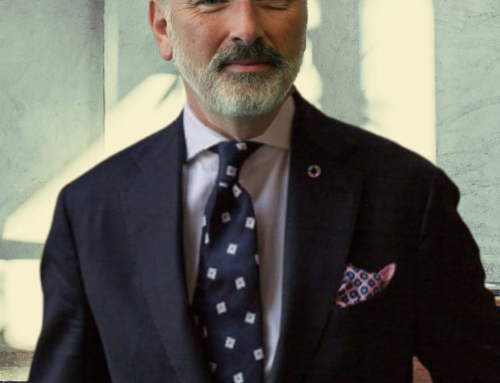Values Based Leadership: Learning from the Pandemic

The COVID-19 pandemic is redefining perceptions of leadership in significant ways. As the crisis unfolds, heads of state, CEOs, and leaders of world organizations are constantly observed, compared, evaluated, and ranked.
Analysts have identified common characteristics among those who are performing well. Although some of these—authenticity and compassion, for example—are not usually considered central to the functions of government or business, they have emerged as differentiators that will continue to be valued as global uncertainty persists.
For educational institutions like the one where I work, teaching leadership skills for a post-COVID environment will be challenging. One reason is that the characteristics that distinguish successful leaders in this time of crisis have little to do with tools, techniques, or models and much more to do with values. These cannot be taught as skills, and can only be conveyed in environments where they are practiced and expected.
While leaders who have come to the fore during the crisis are equipped in distinct ways, certain attributes set them apart from their less successful peers:
- Long-term focus. Preoccupation with short-term concerns like quarterly distributions and election cycles makes leaders less likely to anticipate, prepare for, and hedge against adverse events. During the pandemic, leaders in diverse arenas have distinguished themselves through foresight and long-term planning. Examples include the U.S. State of Ohio health director whose early shutdown limited casualties her state and a Texas grocery chain president who recognized the need for a pandemic plan in 2005.
Foresight and scenario planning have helped governments and businesses act decisively while conserving reserves and maintaining access to resources. Moving forward, effective leaders will assess their positions in light of historical context and plan for diverse outcomes. - A Truly global perspective. Despite abundant rhetoric about the interlinked economy and our globalized word, many leaders have seen global events, partners, and linkages as peripheral to their core interests and purpose. The pandemic is a reminder that what happens anywhere affects people and organizations everywhere, and that far-flung threats may require distant allies.
Recent pharmaceutical alliances to develop COVID-19 vaccines speak to the need for global collaboration. Effective leaders in the post-pandemic world will bear in mind the danger of a zero-sum approach and seek to develop robust global support networks. - Holistic Accountability. The global crisis is heightening the effects of inequitable social programs, which threaten economic recovery in many parts of the world. Government leaders such as Ireland’s prime minister, who has shown compassion and personal accountability through volunteer work as a doctor, stand out as counterexamples.
In business, the perils of a narrow focus on shareholder value are clearly on display. Companies that spent large capital reserves on distributions and buybacks are now requesting bailouts. In contrast, companies with strong environment, social and governance (ESG) ratings have performed well during the crisis. Effective leaders will be committed to environmental sustainability and accountability to diverse stakeholders. - Compassion and inclusion. Prioritizing the interests of wealth and power has left large populations without resources, despite the fact that workers at highest risk play a vital role in every economy. In a show of solidarity, New Zealand’s prime minister recently thanked her “team of five million” for sacrifices made during the country’s strict lockdown. At a time of profound interdependency, effective leaders will serve all sectors of their constituencies.
- Talent cultivation. During the pandemic, new leaders have emerged from all levels of government and corporate hierarchies, and grassroots movements such as home mask-making and medical equipment production have sprung up to fill gaps in guidance from the top. Tools for mass messaging help people with good ideas gain a following quickly, and official titles no longer guarantee respect, authority, or control.
Valuable ideas can come from any level of an organization, and steep hierarchies are increasingly unstable. Effective leaders will integrate and leverage aptitude and creativity, sourcing innovation throughout their organizations to develop holistic solutions.
So how to instill these attributes in emerging leaders?
We must begin by considering education’s contribution to our experience of leadership today—to models that are failing as well as ones that are succeeding—and redirect accordingly.
We must recognize that accommodating paradigm shifts is not just a matter of program updates, but requires significant reorientation. Programs on ethics, corporate social responsibility, and inclusion will need to become cornerstones of leadership programs, rather than ancillary offerings.
Finally, we must acknowledge that to instill values-based policies and perspectives in others, we must institutionalize these in our own organizations so that they are evident and pervasive. Foresight, inclusion, compassion, and authenticity can be learned only in institutions that themselves demonstrate these values through humanistic practice of accountability and transparency.
Deirdre B. Mendez
Director, Center for Global Business
McCombs School of Business
The University of Texas at Austin
LinkedIn: https://www.linkedin.com/in/DeirdreMendez/
https://www.mccombs.utexas.edu/Centers/Center-for-Global-Business
Medium: https://medium.com/@centerforglobalbusiness
Twitter: @CCB_UTexas


Values Based Leadership: Learning from the Pandemic

The COVID-19 pandemic is redefining perceptions of leadership in significant ways. As the crisis unfolds, heads of state, CEOs, and leaders of world organizations are constantly observed, compared, evaluated, and ranked.
Analysts have identified common characteristics among those who are performing well. Although some of these—authenticity and compassion, for example—are not usually considered central to the functions of government or business, they have emerged as differentiators that will continue to be valued as global uncertainty persists.
For educational institutions like the one where I work, teaching leadership skills for a post-COVID environment will be challenging. One reason is that the characteristics that distinguish successful leaders in this time of crisis have little to do with tools, techniques, or models and much more to do with values. These cannot be taught as skills, and can only be conveyed in environments where they are practiced and expected.
While leaders who have come to the fore during the crisis are equipped in distinct ways, certain attributes set them apart from their less successful peers:
- Long-term focus. Preoccupation with short-term concerns like quarterly distributions and election cycles makes leaders less likely to anticipate, prepare for, and hedge against adverse events. During the pandemic, leaders in diverse arenas have distinguished themselves through foresight and long-term planning. Examples include the U.S. State of Ohio health director whose early shutdown limited casualties her state and a Texas grocery chain president who recognized the need for a pandemic plan in 2005.
Foresight and scenario planning have helped governments and businesses act decisively while conserving reserves and maintaining access to resources. Moving forward, effective leaders will assess their positions in light of historical context and plan for diverse outcomes. - A Truly global perspective. Despite abundant rhetoric about the interlinked economy and our globalized word, many leaders have seen global events, partners, and linkages as peripheral to their core interests and purpose. The pandemic is a reminder that what happens anywhere affects people and organizations everywhere, and that far-flung threats may require distant allies.
Recent pharmaceutical alliances to develop COVID-19 vaccines speak to the need for global collaboration. Effective leaders in the post-pandemic world will bear in mind the danger of a zero-sum approach and seek to develop robust global support networks. - Holistic Accountability. The global crisis is heightening the effects of inequitable social programs, which threaten economic recovery in many parts of the world. Government leaders such as Ireland’s prime minister, who has shown compassion and personal accountability through volunteer work as a doctor, stand out as counterexamples.
In business, the perils of a narrow focus on shareholder value are clearly on display. Companies that spent large capital reserves on distributions and buybacks are now requesting bailouts. In contrast, companies with strong environment, social and governance (ESG) ratings have performed well during the crisis. Effective leaders will be committed to environmental sustainability and accountability to diverse stakeholders. - Compassion and inclusion. Prioritizing the interests of wealth and power has left large populations without resources, despite the fact that workers at highest risk play a vital role in every economy. In a show of solidarity, New Zealand’s prime minister recently thanked her “team of five million” for sacrifices made during the country’s strict lockdown. At a time of profound interdependency, effective leaders will serve all sectors of their constituencies.
- Talent cultivation. During the pandemic, new leaders have emerged from all levels of government and corporate hierarchies, and grassroots movements such as home mask-making and medical equipment production have sprung up to fill gaps in guidance from the top. Tools for mass messaging help people with good ideas gain a following quickly, and official titles no longer guarantee respect, authority, or control.
Valuable ideas can come from any level of an organization, and steep hierarchies are increasingly unstable. Effective leaders will integrate and leverage aptitude and creativity, sourcing innovation throughout their organizations to develop holistic solutions.
So how to instill these attributes in emerging leaders?
We must begin by considering education’s contribution to our experience of leadership today—to models that are failing as well as ones that are succeeding—and redirect accordingly.
We must recognize that accommodating paradigm shifts is not just a matter of program updates, but requires significant reorientation. Programs on ethics, corporate social responsibility, and inclusion will need to become cornerstones of leadership programs, rather than ancillary offerings.
Finally, we must acknowledge that to instill values-based policies and perspectives in others, we must institutionalize these in our own organizations so that they are evident and pervasive. Foresight, inclusion, compassion, and authenticity can be learned only in institutions that themselves demonstrate these values through humanistic practice of accountability and transparency.
Deirdre B. Mendez
Director, Center for Global Business
McCombs School of Business
The University of Texas at Austin
LinkedIn: https://www.linkedin.com/in/DeirdreMendez/
https://www.mccombs.utexas.edu/Centers/Center-for-Global-Business
Medium: https://medium.com/@centerforglobalbusiness
Twitter: @CCB_UTexas





